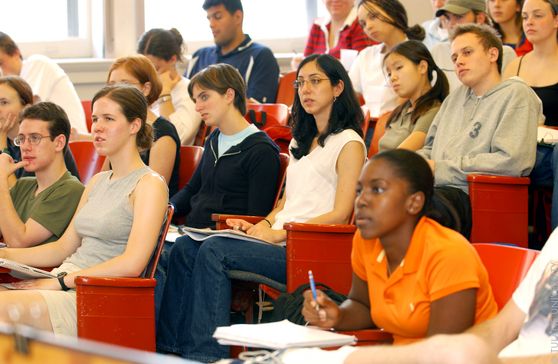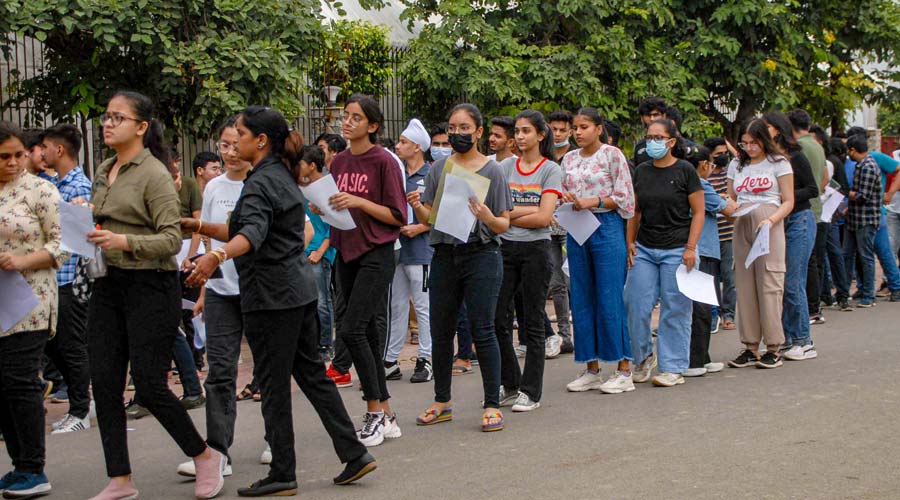Universities and higher education institutions across the country will now be allowed to create up to 25 per cent supernumerary seats for foreign students in their undergraduate (UG) and postgraduate (PG) programmes, UGC chairman Jagadesh Kumar has told PTI.
There will be no entrance tests for these admissions, Kumar said, adding that the decision was taken at a meeting of the University Grants Commission (UGC) held last week to discuss "internationalisation of UG and PG programmes in India."
The supernumerary seats will be created over and above the total sanctioned strength and the decision regarding these seats will be taken by concerned higher educational institutions (HEIs) according to specific guidelines and regulations issued by the regulatory bodies considering the infrastructure, faculty and other requirements.
"Indian HEIs may admit international students based on the equivalence of entry qualification held by them. The equivalence is to be determined by UGC or any other body recognised by UGC for such purpose or the concerned regulatory bodies of the country. HEIs may adopt a transparent admission process for admitting the international students," Kumar told PTI.
"HEIs may create up to 25 per cent supernumerary seats for international students, over and above of their total sanctioned enrolment for undergraduate and postgraduate programmes.
"The decision regarding 25 per cent supernumerary seats has to be carried out by the concerned higher educational institutions as per specific guidelines/regulations issued by the regulatory bodies considering the infrastructure, faculty and other requirements," he added.
The supernumerary seats for international students will not include the international students under exchange programmes and through Memorandum of Understanding (MoU) between institutions or between Indian government and other countries.
The HEIs will also be permitted to admit international students using a transparent admission process as is done by the foreign universities and that these students do not have to go through the entrance process used for admissions in India.
"The seats shall be exclusively meant for the international students both in the undergraduate and postgraduate programmes. A seat remained unfilled in the supernumerary category, shall not be allocated to anyone other than an international student. International students in this context shall be defined as the one who shall possess a foreign passport," Kumar explained.
The commission has decided that the provision of creating supernumerary seats for international students should be formalised by way of approval of statutory body of the HEIs in accordance with the guidelines and regulations issued by the regulatory bodies from time to time.
"The supernumerary seats in professional and technical institutes shall be governed by the respective statutory bodies. All details regarding the number of seats available for international students in each programme, fee prescribed for the same, admission process, eligibility conditions etc. shall be made available on the website of the HEI," he said.
According to Ministry of External Affairs' data, a total of 23,439 foreign students arrived in India in 2021. However, the number used to higher in pre-pandemic years.
In 2019, over 75,000 international students had come to India for higher studies.
Internationalisation of higher education is an essential aspect of the National Education Policy 2020 and helps in integrating the international and intercultural dimensions in higher education," Kumar said.
"Opportunities to attract international students, academics and funding are growing and many Indian HEIs are now committed to increase their international outreach," Kumar said.
"In order to facilitate the internationalisation of Indian HEIs, the UGC has framed the guidelines for admission and creation of supernumerary seats for international students," he said.
"The main objectives of these guidelines are to facilitate a smooth and simple admission of international students in higher educational institutions of India, to create a favourable environment for attracting international students to Indian higher education system, and to make India a preferred destination for international students," he added.












